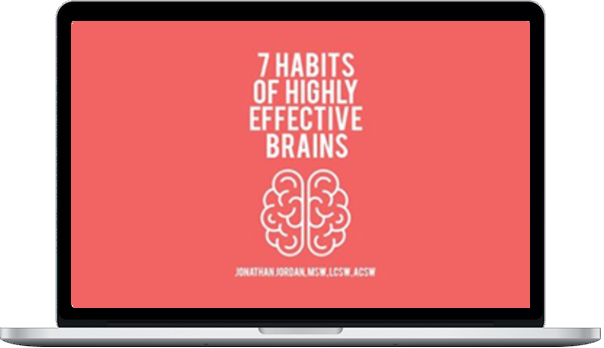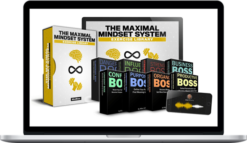Jonathan Jordan – 7 Habits of Highly Effective Brains
$50.00 $9.00
»Delivery: Within 24hs
Description
Jonathan Jordan – 7 Habits Of Highly Effective Brains
Description Of 7 Habits of Highly Effective Brains
In this seminar recording, you will discover 7 habits that can greatly improve the effectiveness of your brain; strategies for overcoming distraction and lack of focus; and brain-based techniques to boost your mental performance. Groundbreaking neuroscience information will be presented in plain English. Learn how some surprisingly simple behaviors can actually change your brain for the better. By the end of the recording, you will be able to immediately apply these evidence-based habits to transform your brain’s functioning and enhance your mental performance.
Jonathan Jordan is an enthusiastic presenter who enjoys interaction with the attendees and presents the content in easy-to-understand language. Neuroscience research confirms that people learn better when they are having fun and you will find this teleseminar to be both interesting and rewarding.
- Cutting-edge neuroscience breakthroughs
- Make the most of your brain
- Why attitude is so important to your brain
- Change your brain, change your life
- The art of using your whole brain
- Neuroscience in plain English
- Simple behaviors that activate your brain
- How to boost your brain’s performance
Target Audience
Counselors, Social Workers, Psychologists, Psychotherapists, Case Managers, Marriage and Family Therapists, Addiction Counselors, Nurses, Other Mental Health Professionals
What You’ll Learn In 7 Habits Of Highly Effective Brains
Objectives
- Summarize why breakthroughs in neuroscience are so important to improving the effectiveness of our brains.
- List at least four of the 7 habits of an effective brain.
- Describe why attitude is so important to brain health.
- Discuss why mental challenges can change the brain.
Outline
Recent Breakthroughs in Neuroscience, in Plain English
- Habit #1 Nutritious Diet – How foods effect your brain (and how to train your brain to lose weight)
- Habit #2 Focus Sequentially – Why multitasking hinders your brain’s performance, and how to fix it
- Habit #3 Be Physically Active – Why motion improves emotions
- Habit #4 Social Participation – Why social connections help your brain’s connections
- Habit #5 Sleep Well – What happens to your brain when you are overdrawn at the sleep bank?
- Habit #6 Mental Challenges – Simple ways to give your whole brain a workout
- Habit #7 Have a Positive Attitude – Why this habit is the most important habit of all
About Jonathan Jordan, MSW, LCSW, ACSW
Global Change Management, Inc.
Jonathan Jordan, MSW, LCSW, ACSW, is a renowned licensed psychotherapist and clinical supervisor who has a love for both animals and neuroscience. For decades, he has combined these two loves by incorporating animal-assisted interventions into his brain-based professional practice. Over the years, Jonathan has trained several of his own dogs to be successful therapy animals.
Not only does he integrate his therapy dogs into his own practice, Jonathan also works closely with a variety of other medical and mental health professionals to engage his therapy animals in their respective treatment modalities. He has co-developed a unique and evidence-based approach to animal-assisted intervention, the KADRA Model, which engages animals to enhance mindfulness in humans. Jonathan is a long-time member of the prestigious Society for Neuroscience and is a charter member of the Society for Social Neuroscience. Thus, he has extensive knowledge of both human and animal neuroscience research.
Jonathan is an international speaker and author on the topic of animal-assisted interventions motivating others to harness the power of the human-animal bond. He has trained thousands of professionals in his unique synthesis of East-West brain-based practices and AAT. Jonathan is currently writing a book about animal-assisted interventions that explains the incredible range of therapeutic benefits that come from the human-animal emotional bond.
He serves as a faculty fellow of Florida State University and was engaged by the United States Senate to deliver brain-based professional development workshops to the entire Senate Staff on Capitol Hill in Washington, DC.
Speaker Disclosures:
Financial: Jonathan Jordan is the President of Global Change Management, Inc. He is a faculty fellow at Florida State University, and he earns royalties as a published author. He receives a speaking honorarium and recording royalties from PESI, Inc. He has no relevant financial relationships with ineligible organizations.
Non-financial: Jonathan Jordan is a member of the Society for Social Neuroscience.
More courses from the same author: Jonathan Jordan
Delivery Policy
When will I receive my course?
You will receive a link to download your course immediately or within 1 to 21 days. It depends on the product you buy, so please read the short description of the product carefully before making a purchase.
How is my course delivered?
We share courses through Google Drive, so once your order is complete, you'll receive an invitation to view the course in your email.
To avoid any delay in delivery, please provide a Google mail and enter your email address correctly in the Checkout Page.
In case you submit a wrong email address, please contact us to resend the course to the correct email.
How do I check status of my order?
Please log in to HealingCourse account then go to Order Page. You will find all your orders includes number, date, status and total price.
If the status is Processing: Your course is being uploaded. Please be patient and wait for us to complete your order. If your order has multiple courses and one of them has not been updated with the download link, the status of the order is also Processing.
If the status is Completed: Your course is ready for immediate download. Click "VIEW" to view details and download the course.
Where can I find my course?
Once your order is complete, a link to download the course will automatically be sent to your email.
You can also get the download link by logging into your HealingCourse account then going to Downloads Page.
Related products
Total sold: 26









